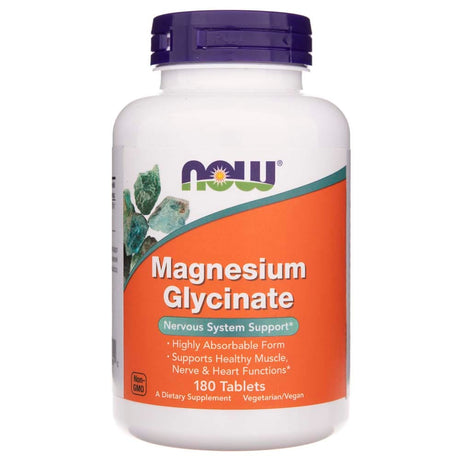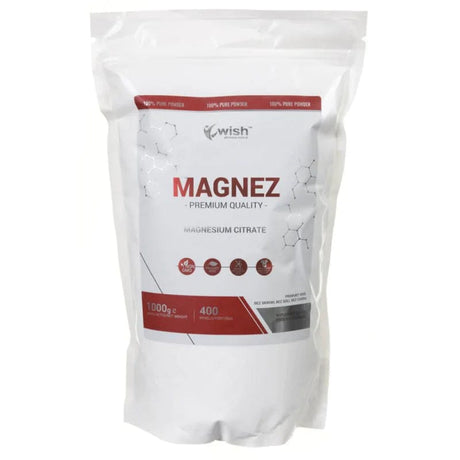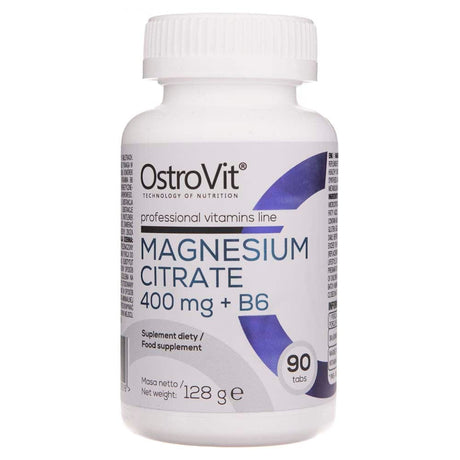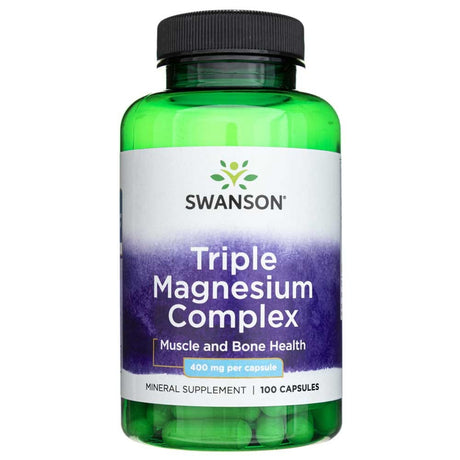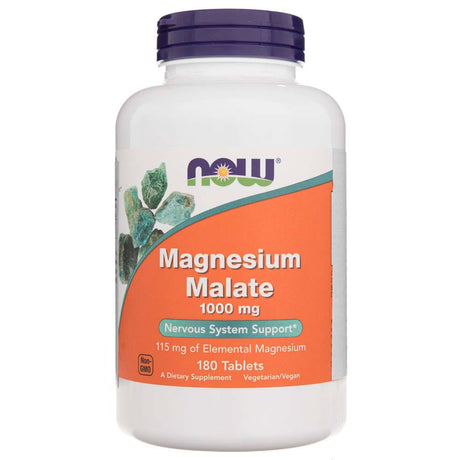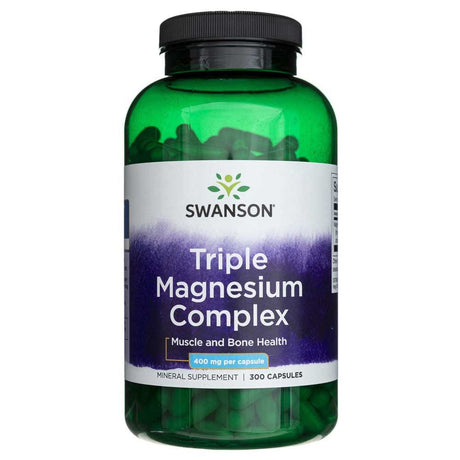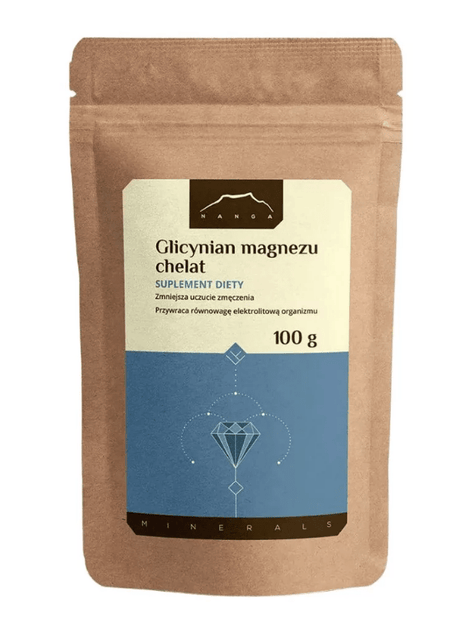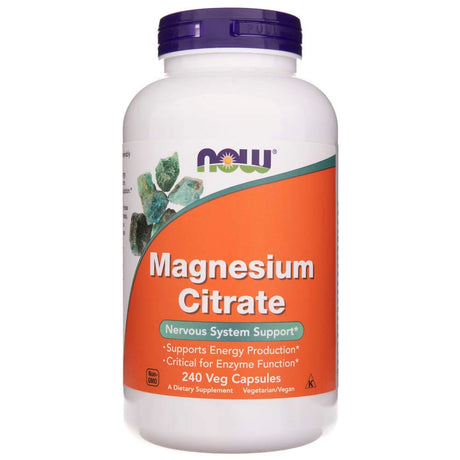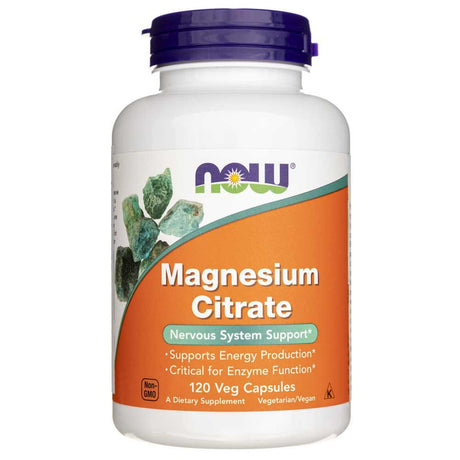Now Foods
Now Foods Magnesiumglycinat 100 mg - 180 tabletter
Ordinarie pris 254.39 krEnhetspris1.41 kr varderaWish Pharmaceutical
Wish Magnesiumcitrat, pulver - 1000 g
Ordinarie pris 208.19 krEnhetspris208.19 kr /kgOstrovit
Ostrovit Magnesiumcitrat 400 mg + B6 - 90 tabletter
Försäljningspris 45.52 kr Ordinarie pris 50.59 krEnhetspris0.51 kr varderaNow Foods
Now Foods Magnesiumbisglycinatpulver - 227 g
Ordinarie pris 182.29 krEnhetspris803.04 kr /kgSwanson
Swanson Triple Magnesium Complex 400 mg - 100 kapslar
Ordinarie pris 56.19 krEnhetspris0.56 kr varderaNow Foods
Now Foods Magnesiummalat 1000 mg - 180 tabletter
Ordinarie pris 228.49 krEnhetspris1.27 kr varderaSwanson
Swanson Magnesium Taurate 100 mg - 120 tabletter
Ordinarie pris 180.09 krEnhetspris1.50 kr varderaSwanson
Swanson Triple Magnesium Complex 400 mg - 300 kapslar
Ordinarie pris 151.89 krEnhetspris0.51 kr varderaAliness
Aliness Magnesiumcitrat 125 mg med B6 - 100 kapslar
Ordinarie pris 119.29 krEnhetspris1.19 kr varderaReflex Nutrition
Reflex Nutrition Magnesium Bisglycinate,375 mg - 90 kapslar
Ordinarie pris 95.59 krEnhetspris1.06 kr varderaAliness
Aliness Magnesiumcitrat 100 mg med kalium 150 mg, B6 (P-5-P) - 100 veg. kapslar
Ordinarie pris 129.39 krEnhetspris1.29 kr varderaDoctor's Best
Doctor's Best Magnesium med hög absorptionsförmåga 100 mg - 240 tabletter
Ordinarie pris 322.99 krEnhetspris1.35 kr varderaAliness
Aliness Magnesium Taurate 100 mg med B6 (P-5-P) - 100 kapslar
Ordinarie pris 189.09 krEnhetspris1.89 kr varderaLife Extension
Life Extension Neuro-Mag Magnesium L-Threonate - 90 kapslar
Ordinarie pris 472.79 krEnhetspris5.25 kr varderaVitaler's
Vitaler's ZMA Mg 240 mg + Zn 15 mg + B6 10 mg - 120 kapslar
Ordinarie pris 83.19 krEnhetspris0.69 kr varderaDoctor's Best
Doctor's Best Magnesium med hög absorptionsförmåga 100 mg - 120 tabletter
Ordinarie pris 180.09 krEnhetspris1.50 kr varderaNow Foods
Now Foods Magnesiumcitrat 400 mg - 240 vegokapslar
Ordinarie pris 326.39 krEnhetspris1.36 kr varderaNow Foods
Now Foods Magnesiumcitrat - 180 softgels
Ordinarie pris 253.19 krEnhetspris1.41 kr varderaNow Foods
Now Foods Magnesiumcitrat 400 mg - 120 vegokapslar
Ordinarie pris 174.39 krEnhetspris1.45 kr varderaYango
Yango Magnesium 3 former 530 mg - 90 kapslar
Ordinarie pris 95.59 krEnhetspris1.06 kr varderaLife Extension
Life Extension Magnesiumkapslar 500 mg - 100 vegokapslar
Ordinarie pris 115.89 krEnhetspris1.16 kr vardera
Magnesium: Det viktiga mineralet för optimal hälsa
Magnesium är ett oumbärligt mineral som spelar en avgörande roll för att upprätthålla optimal hälsa. Detta ofta förbisedda element är avgörande för muskelfunktion, blodtrycksreglering, och energiförsörjning till nervvävnad, bland många andra kritiska biologiska processer. Att förstå vikten av magnesium och säkerställa ett tillräckligt intag kan bidra till att lindra många hälsoproblem och främja det allmänna välbefinnandet.
Magnesiums vitala funktioner i kroppen
Magnesiums inverkan på hälsan är långtgående och mångfacetterad:
- Stödjer korrekt muskelfunktion, till nytta för idrottare och personer med muskelsmärta eller spänning
- Förbättrar koncentration och minne, avgörande för situationer med hög stress och mental prestation
- Hjälper till att minska risken för åderförkalkning och typ II-diabetes
- Bibehåller friska ben och tänder genom att påverka kalcium nivåer
- Reglerar blodtrycket och främjar kardiovaskulär hälsa
- Bidrar till energiproduktion och ämnesomsättning
Att känna igen magnesiumbrist
Magnesiumbrist kan uppstå även med en balanserad kost. Vissa faktorer ökar risken för brist:
- Medicinska tillstånd som påverkar näringsupptaget
- Graviditet och amning
- Regelbunden konsumtion av koffein, som kan öka utsöndringen av magnesium
Vanliga symtom på magnesiumbrist är bl.a:
- Huvudvärk och migrän
- Ihållande trötthet
- Irritabilitet och humörförändringar
- Muskelkramper, särskilt i vaderna
- Ryckningar i ögonlocken
- Koncentrationssvårigheter
Vem behöver magnesiumtillskott?
Magnesium för barn
Växande barn behöver tillräckligt med magnesium för att utvecklas ordentligt. Det hjälper till att bibehålla fokus, lugna överaktivt beteende, och stödja det allmänna välbefinnandet. Lättadministrerade former som geler eller sprayer kan uppmuntra till regelbundet tillskott hos barn.
Magnesium under graviditet
Gravida och ammande kvinnor har ett ökat behov av magnesium. När kosten inte ensam kan tillgodose dessa behov blir, tillskott avgörande för både moderns och fostrets hälsa.
Magnesium för stresshantering
Personer som utsätts för hög stress eller intensivt mentalt arbete kan ha nytta av magnesiumtillskott. Det stöder kognitiv funktion och hjälper till att hantera stressrelaterade symtom.
Magnesiumkällor i kosten
Tillskott kan vara fördelaktigt, men det är viktigt att införliva magnesiumrika livsmedel i kosten. Bra källor inkluderar:
- Bladgröna grönsaker (t.ex., spenat)
- Nötter (särskilt mandel och cashewnötter)
- Frön (pumpafrön, solrosfrön)
- Fullkorn
- Baljväxter
- Mörk choklad
Olika typer av magnesiumtillskott
När du väljer ett magnesiumtillskott, bör du överväga följande former:
- Magnesiumcitrat: Mycket absorberbart men kan ha en mild laxerande effekt
- Magnesiumglycinat: Väl absorberat utan laxerande egenskaper, perfekt för dem med känslig matsmältning
- Magnesiumkarbonat: Kan hjälpa till med matsmältningsproblem men har lägre absorption (cirka 30%)
Magnesiumkombinationer för förbättrade fördelar
Magnesiumtillskott kombineras ofta med andra näringsämnen för synergistiska effekter:
- Magnesium med kalium: Förbättrar absorptionen och den övergripande mineralbalansen
- Magnesium med vitamin B6: Förbättrar magnesiumabsorptionen och stöder stresshantering
Slutsats: Omfamna magnesium för bättre hälsa
Magnesium är en hörnsten för god hälsa, och påverkar många kroppsfunktioner. Oavsett om det är genom kost eller tillskott, är det viktigt att säkerställa ett tillräckligt magnesiumintag för att upprätthålla optimal hälsa och förebygga olika hälsoproblem. Om du överväger magnesiumtillskott, bör du rådgöra med vårdpersonal för att fastställa den bästa formen och doseringen för dina behov.
Utforska vårt utbud av högkvalitativa magnesiumtillskott hos Medpak för att stödja din allmänna hälsa och ditt välbefinnande. Kom ihåg, att även om tillskott kan vara fördelaktiga, bör de komplettera en balanserad kost och en hälsosam livsstil för bästa resultat.
